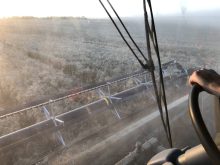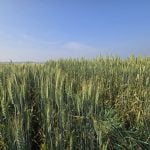CNS Canada — Canada’s grains industry found itself shocked when the Canadian Oilseed Processors Association (COPA) announced Friday it would stop publishing its weekly report on member crushings.
“I loved that report. In Western Canada, or Canada in general, I think any reports that give you kind of a weekly snapshot of what’s happening in terms of usage (are important),” said Neil Townsend with FarmLink Marketing Solutions.
The report, detailing how much canola and soybeans were crushed in Canada, was sent out weekly and followed by different industry professionals across the country.
Read Also

U.S. grains: Soy futures set 15-month high after China agrees to purchases
U.S. soybean futures reached a 15-month high on Thursday after President Donald Trump’s administration said top-importer China agreed to buy tens of millions of tons of American crops in the next few years as part of a trade truce.
COPA executive director Chris Vervaet, when reached Monday, said the decision came as part of COPA’s future plans for the organization.
“As an association we’ve just decided to streamline our priorities for 2018 and the weekly publication was just something that we ranked a lower priority for us,” he said.
COPA is a federally incorporated non-profit industry association which works in partnership with the Canola Council of Canada to represent the interests of Canadian oilseed processors. Its members are ADM, Bunge Canada, Cargill, Louis Dreyfus, Richardson Oilseed and Viterra.
Last month Richardson announced it had pulled its funding from the Canola Council of Canada, the Flax Council of Canada and Soy Canada, stating it didn’t think it was getting any value out of the organizations.
When Vervaet was asked if COPA’s decision to end the crush report was related to this, he said it was not.
COPA said crushing data will still be available through Statistics Canada’s annual and monthly statistics. COPA will also update statistics monthly on its website based on the information from Statistics Canada, Vervaet added.
While the information will still be available, Townsend said it won’t be nearly as timely as before. Statistics Canada’s data isn’t usually released until later.
“The lag is too long. So you’re kind of flying blind,” he said, adding Canadian farmers don’t have nearly as much access to information as their counterparts in other countries.
In Australia shipping lineups from its ports are released and the U.S. Department of Agriculture releases data weekly.
There are other ways to access similar information to the COPA member crushings report. The Canadian Grain Commission releases weekly domestic disappearance reports, which for canola basically means crush numbers.
“I’ve watched the two; they’re close, they’re not always the same,” said John DePape of FARMCo.
“I’m not happy when we lose good data but I think there’s still decent data there through the Grain Commission.”
Vervaet said COPA did consider the value of the weekly report before ending it, but hadn’t received a lot of feedback on it.
Townsend said he was caught off-guard when the announcement was made and to his knowledge the grains industry wasn’t consulted before the decision was made.
“I have spoken to a few other people. We instantly sent them an email (when we heard) and just said, ‘Hey, we really like this, we really appreciated it,’ ” he said.
To Townsend the decision to end the report is the wrong direction for the industry to take. In his opinion there needs to be more transparency throughout the Canadian grains industry.
“In the U.S. they report those numbers every week. I think farmers deserve it… I’d just like to see more transparency in Western Canada.”
— Ashley Robinson writes for Commodity News Service Canada, a Glacier FarmMedia company specializing in grain and commodity market reporting. Follow her at @AshleyMR1993 on Twitter.













